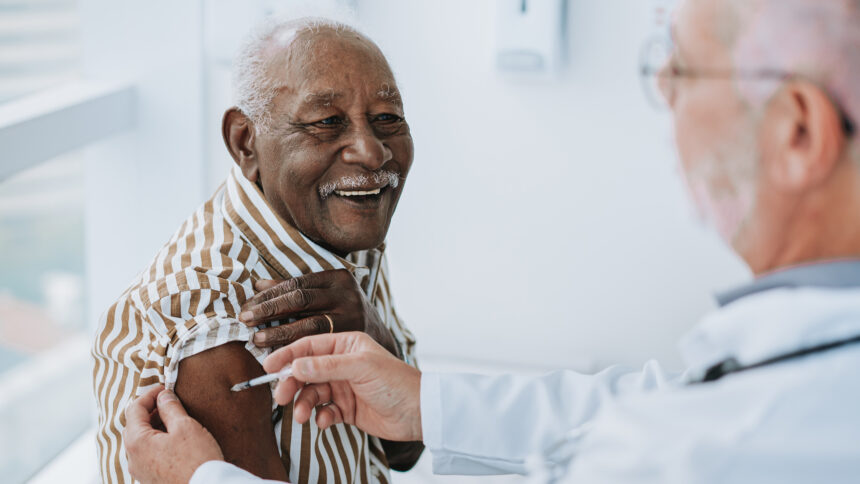
Providers and top federal officials intent on saving more seniors’ lives met near the White House Wednesday to plan nursing home vaccination improvements.
Health and Human Services Secretary Xavier Becerra met with a group of skilled nursing providers, clinicians and nursing home residents to discuss their approach to the next respiratory virus season, even as cases of three main illnesses remain elevated this season.
The focus was on preparing for vaccination efforts to improve protection ahead of the 2024-25 flu and RSV season, and, possibly, another COVID19 spike.
“We had all representation at the table today,’ said Jodi Eyigor, director of nursing home quality and policy for LeadingAge, who attended the event at the Executive Office Building. “The tone of the meeting was very much, ‘What can we do to help,’ which is very much how we want to go into this.”
The current national COVID vaccination campaign has been lackluster, and the rate of nursing home residents considered up-to-date on their shots continues to lag that of seniors in general. Provider advocates have repeatedly asked for more and better coordinated help from the federal government.
“It is evident that our country faces significant, systemic challenges with vaccine reluctance that requires a collective endeavor by public health officials, other healthcare providers, and the public to overcome,” David Gifford, MD, chief medical officer for the American Health Care Association/National Center for Assisted Living told McKnight’s Long-Term Care News in an emailed statement Wednesday night.
He attended the meeting with AHCA Board Chairman Phil Scalo.
“Conversations like those hosted today by the administration can help us find a productive and positive path forward, whether during this cold and flu season or the next,” Gifford added. “As providers, we remain persistent in educating and encouraging families and residents to get vaccinated.”
He said the administration’s help in reinforcing the importance of the vaccines, “especially for our nation’s seniors and those who care for them” was sincerely appreciated.
Underwhelming vaccinations
As of Jan. 26, the CDC reported 41% of adults age 65-plus were up-to-date with COVID shots. That figure, however, hovered at just 38.5% among nursing home residents as of Jan. 14 (the latest date for which the Centers for Medicare & Medicaid Services has posted data).
Wednesday’s in-person meeting followed virtual meetings between Becerra and providers in December and January. At the last meeting, Becerra broached the topic of concerningly low COVID vaccination rates among long-term care residents.
Provider organizations referred specific questions about the secretary’s comments Wednesday to HHS officials. The agency did not immediately respond to a query or post a recap of the meeting by deadline.
Skilled nursing leaders have continued to advocate for more federal support and the simplification of regulatory burdens that have sometimes complicated the 2023-24 vaccination push. Providers, like many health officials, also say they are dealing with vaccine fatigue that reached long-term care residents and their families after high vaccine uptake during earlier COVID waves.
Eyigor said cueing up stronger messaging ahead of 2024-25 vaccination campaigns was a key part of Wednesday’s conversation.
“With regard to demand, how do we share a message that makes a difference? This isn’t necessarily about more information, though we definitely want information and data that speaks to our present circumstances,” she recounted on a call with members shortly after the meeting in Washington, DC. “But how do we make sure that the message is heard? A big part of that is, are we hearing the person whose behavior we are aiming to modify? Are we hearing the residents and families and the staff that we want to get vaccinated?”
Eyigor said providers also sought more help from the government on clarity around reimbursement.
“That has been a stumbling point this year since vaccines came into the commercial space,” as had supply issues for long-term care pharmacies, she said.
LeadingAge previously asked Becerra to enable single-dose vaccine orders for nursing homes and a new policy that would allow pharmacies to bill Medicare Part B for vaccinating residents during a Part A stay.
Resistance amid high activity
Gifford emphasized that long-term care “does not operate in a vacuum,” and said residents and staff have COVID vaccination rates “comparable” to older adults in the community and other healthcare settings.
Wednesday’s meeting addressed the need to respond to additional respiratory threats.
Centers for Disease Control and Prevention data reported Jan. 26 shows that flu vaccination coverage was at 47% among all adults 18 and older, but it hit 72.8% among adults age 65 and older. Meanwhile, the share of adults 60-plus that received an RSV vaccine was 20.8%. That vaccine was licensed for the first time last May.
This year’s respiratory threats are not over, even if the federal government is already looking ahead to the next flu and virus season.
COVID and RSV cases have declined since peaking around the Christmas and New Year holidays, Axios reported this week. But the CDC reported that 22 jurisdictions were still experiencing “high” or “very high” respiratory virus activity. That’s down from 37 jurisdictions two weeks ago. Meanwhile, positive flu tests remain high nationwide.




